Case Note: Harding v Commissioner of Taxation - LEGL300 Semester 1
VerifiedAdded on 2023/04/20
|6
|1070
|185
Case Study
AI Summary
This case study provides a comprehensive summary of the Harding v Commissioner of Taxation case, focusing on the central legal issue of whether Mr. Harding should be considered an Australian resident for tax purposes in 2011. It outlines the 'resides test' and the 'permanent place of abode test' as relevant legal principles, referencing key judgments such as Applegate v FCT (1979). The analysis details the application of these laws to the facts of the case, including the initial judgment by Justice Derrington and the subsequent appeal. The study concludes with an opinion on the practical impacts of the case, particularly concerning expatriates and the need for clarity in Australian tax residency laws. The document includes relevant citations and references.
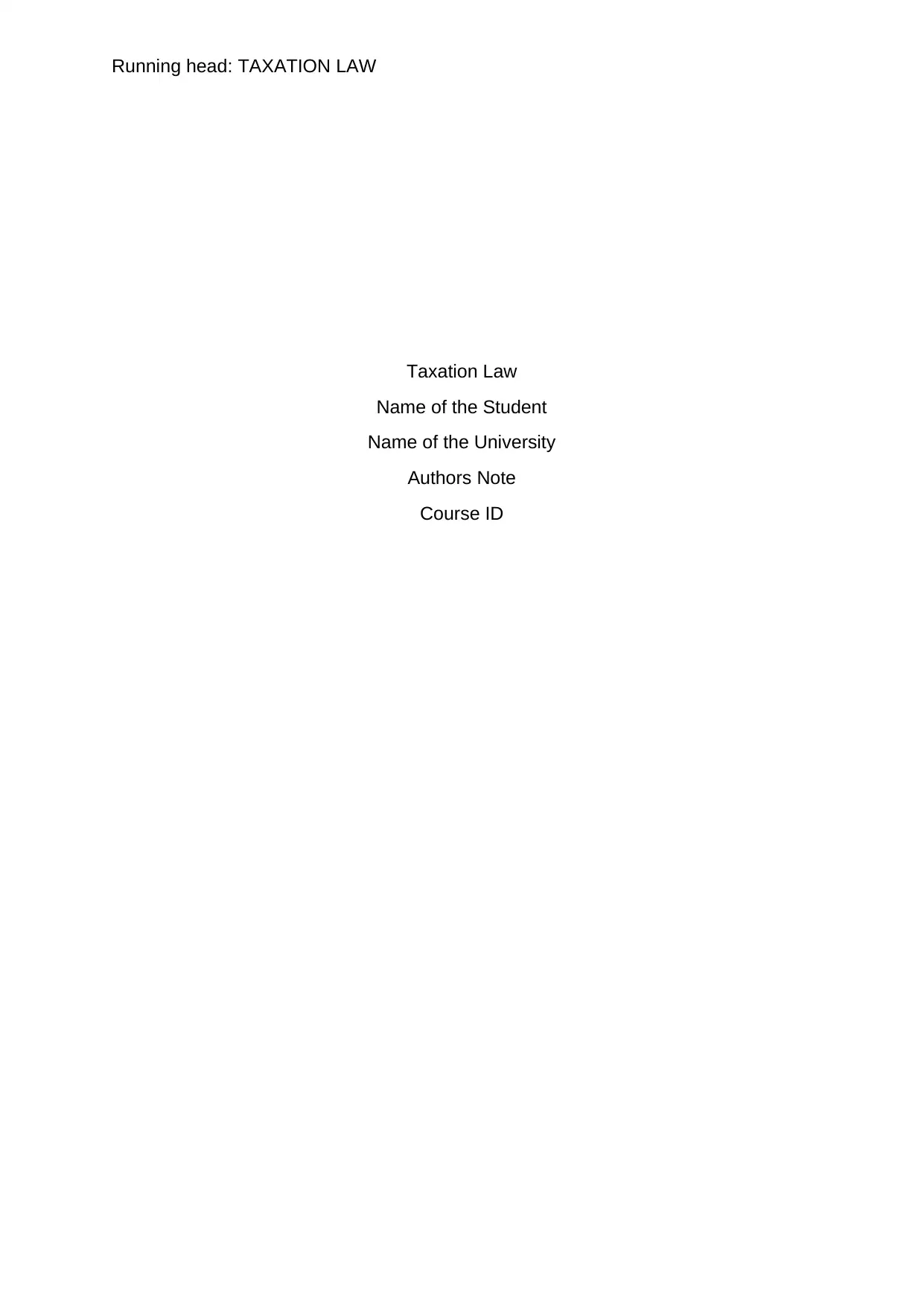
Running head: TAXATION LAW
Taxation Law
Name of the Student
Name of the University
Authors Note
Course ID
Taxation Law
Name of the Student
Name of the University
Authors Note
Course ID
Paraphrase This Document
Need a fresh take? Get an instant paraphrase of this document with our AI Paraphraser
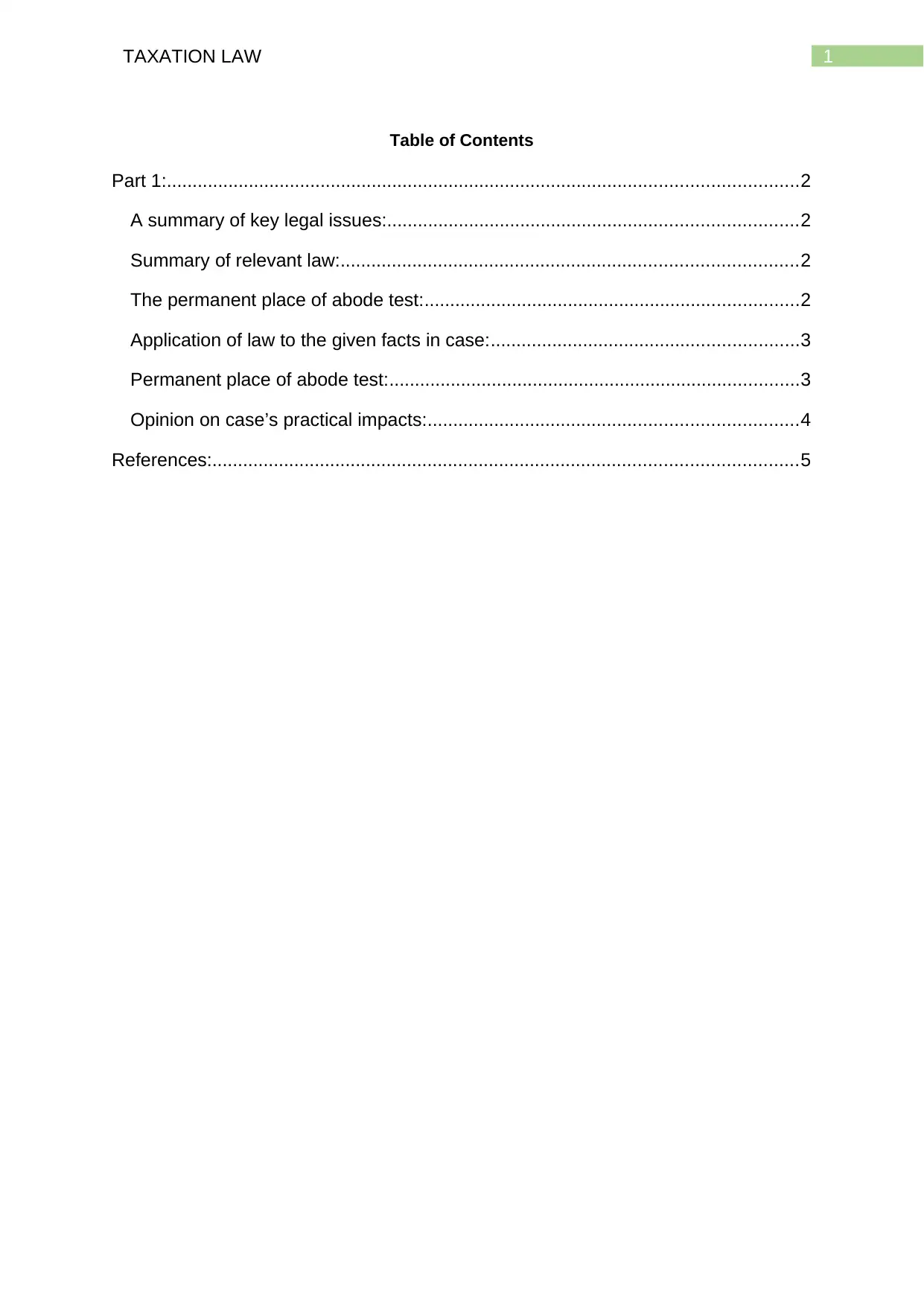
1TAXATION LAW
Table of Contents
Part 1:...........................................................................................................................2
A summary of key legal issues:................................................................................2
Summary of relevant law:.........................................................................................2
The permanent place of abode test:.........................................................................2
Application of law to the given facts in case:............................................................3
Permanent place of abode test:................................................................................3
Opinion on case’s practical impacts:........................................................................4
References:..................................................................................................................5
Table of Contents
Part 1:...........................................................................................................................2
A summary of key legal issues:................................................................................2
Summary of relevant law:.........................................................................................2
The permanent place of abode test:.........................................................................2
Application of law to the given facts in case:............................................................3
Permanent place of abode test:................................................................................3
Opinion on case’s practical impacts:........................................................................4
References:..................................................................................................................5
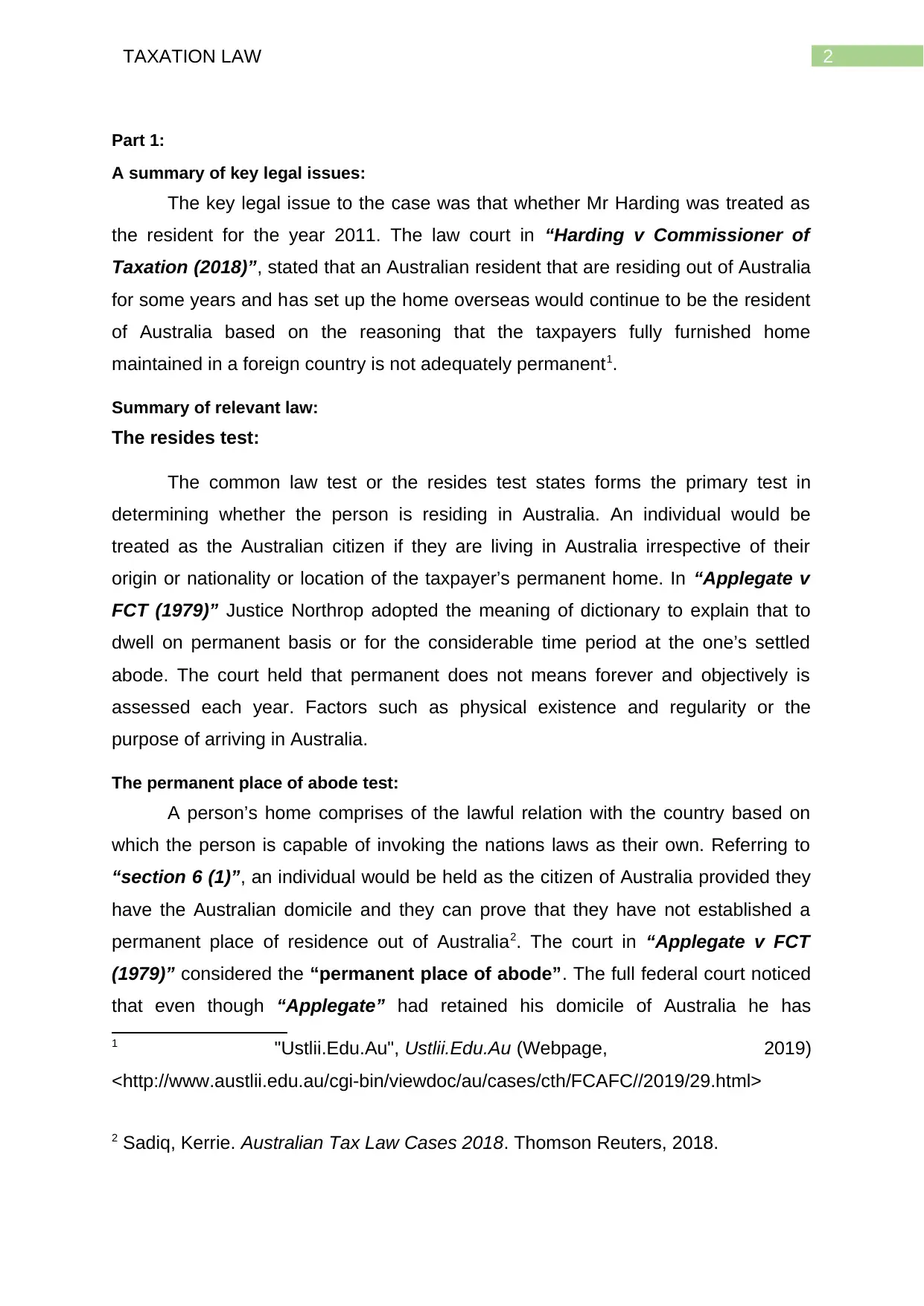
2TAXATION LAW
Part 1:
A summary of key legal issues:
The key legal issue to the case was that whether Mr Harding was treated as
the resident for the year 2011. The law court in “Harding v Commissioner of
Taxation (2018)”, stated that an Australian resident that are residing out of Australia
for some years and has set up the home overseas would continue to be the resident
of Australia based on the reasoning that the taxpayers fully furnished home
maintained in a foreign country is not adequately permanent1.
Summary of relevant law:
The resides test:
The common law test or the resides test states forms the primary test in
determining whether the person is residing in Australia. An individual would be
treated as the Australian citizen if they are living in Australia irrespective of their
origin or nationality or location of the taxpayer’s permanent home. In “Applegate v
FCT (1979)” Justice Northrop adopted the meaning of dictionary to explain that to
dwell on permanent basis or for the considerable time period at the one’s settled
abode. The court held that permanent does not means forever and objectively is
assessed each year. Factors such as physical existence and regularity or the
purpose of arriving in Australia.
The permanent place of abode test:
A person’s home comprises of the lawful relation with the country based on
which the person is capable of invoking the nations laws as their own. Referring to
“section 6 (1)”, an individual would be held as the citizen of Australia provided they
have the Australian domicile and they can prove that they have not established a
permanent place of residence out of Australia2. The court in “Applegate v FCT
(1979)” considered the “permanent place of abode”. The full federal court noticed
that even though “Applegate” had retained his domicile of Australia he has
1 "Ustlii.Edu.Au", Ustlii.Edu.Au (Webpage, 2019)
<http://www.austlii.edu.au/cgi-bin/viewdoc/au/cases/cth/FCAFC//2019/29.html>
2 Sadiq, Kerrie. Australian Tax Law Cases 2018. Thomson Reuters, 2018.
Part 1:
A summary of key legal issues:
The key legal issue to the case was that whether Mr Harding was treated as
the resident for the year 2011. The law court in “Harding v Commissioner of
Taxation (2018)”, stated that an Australian resident that are residing out of Australia
for some years and has set up the home overseas would continue to be the resident
of Australia based on the reasoning that the taxpayers fully furnished home
maintained in a foreign country is not adequately permanent1.
Summary of relevant law:
The resides test:
The common law test or the resides test states forms the primary test in
determining whether the person is residing in Australia. An individual would be
treated as the Australian citizen if they are living in Australia irrespective of their
origin or nationality or location of the taxpayer’s permanent home. In “Applegate v
FCT (1979)” Justice Northrop adopted the meaning of dictionary to explain that to
dwell on permanent basis or for the considerable time period at the one’s settled
abode. The court held that permanent does not means forever and objectively is
assessed each year. Factors such as physical existence and regularity or the
purpose of arriving in Australia.
The permanent place of abode test:
A person’s home comprises of the lawful relation with the country based on
which the person is capable of invoking the nations laws as their own. Referring to
“section 6 (1)”, an individual would be held as the citizen of Australia provided they
have the Australian domicile and they can prove that they have not established a
permanent place of residence out of Australia2. The court in “Applegate v FCT
(1979)” considered the “permanent place of abode”. The full federal court noticed
that even though “Applegate” had retained his domicile of Australia he has
1 "Ustlii.Edu.Au", Ustlii.Edu.Au (Webpage, 2019)
<http://www.austlii.edu.au/cgi-bin/viewdoc/au/cases/cth/FCAFC//2019/29.html>
2 Sadiq, Kerrie. Australian Tax Law Cases 2018. Thomson Reuters, 2018.
⊘ This is a preview!⊘
Do you want full access?
Subscribe today to unlock all pages.

Trusted by 1+ million students worldwide
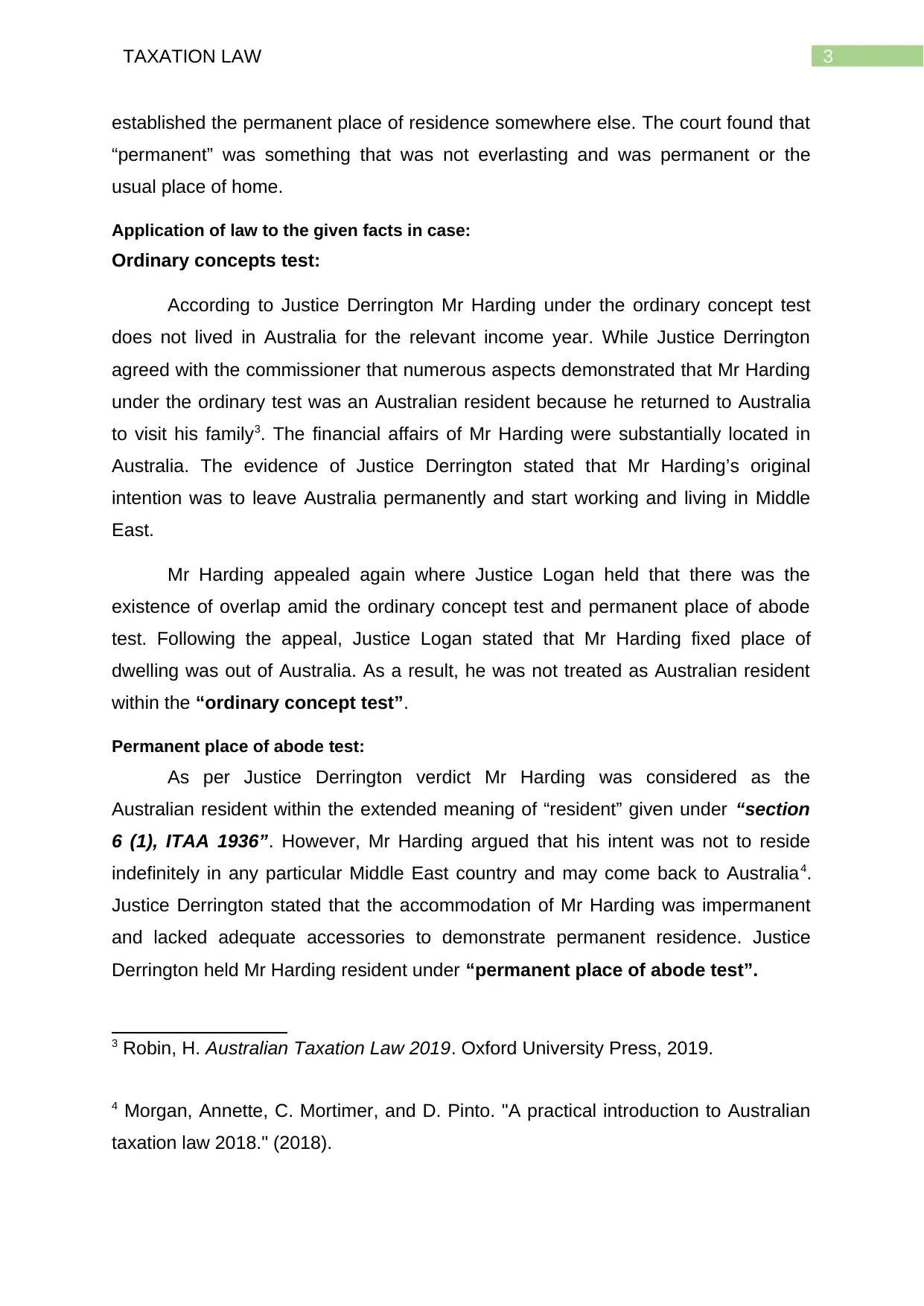
3TAXATION LAW
established the permanent place of residence somewhere else. The court found that
“permanent” was something that was not everlasting and was permanent or the
usual place of home.
Application of law to the given facts in case:
Ordinary concepts test:
According to Justice Derrington Mr Harding under the ordinary concept test
does not lived in Australia for the relevant income year. While Justice Derrington
agreed with the commissioner that numerous aspects demonstrated that Mr Harding
under the ordinary test was an Australian resident because he returned to Australia
to visit his family3. The financial affairs of Mr Harding were substantially located in
Australia. The evidence of Justice Derrington stated that Mr Harding’s original
intention was to leave Australia permanently and start working and living in Middle
East.
Mr Harding appealed again where Justice Logan held that there was the
existence of overlap amid the ordinary concept test and permanent place of abode
test. Following the appeal, Justice Logan stated that Mr Harding fixed place of
dwelling was out of Australia. As a result, he was not treated as Australian resident
within the “ordinary concept test”.
Permanent place of abode test:
As per Justice Derrington verdict Mr Harding was considered as the
Australian resident within the extended meaning of “resident” given under “section
6 (1), ITAA 1936”. However, Mr Harding argued that his intent was not to reside
indefinitely in any particular Middle East country and may come back to Australia4.
Justice Derrington stated that the accommodation of Mr Harding was impermanent
and lacked adequate accessories to demonstrate permanent residence. Justice
Derrington held Mr Harding resident under “permanent place of abode test”.
3 Robin, H. Australian Taxation Law 2019. Oxford University Press, 2019.
4 Morgan, Annette, C. Mortimer, and D. Pinto. "A practical introduction to Australian
taxation law 2018." (2018).
established the permanent place of residence somewhere else. The court found that
“permanent” was something that was not everlasting and was permanent or the
usual place of home.
Application of law to the given facts in case:
Ordinary concepts test:
According to Justice Derrington Mr Harding under the ordinary concept test
does not lived in Australia for the relevant income year. While Justice Derrington
agreed with the commissioner that numerous aspects demonstrated that Mr Harding
under the ordinary test was an Australian resident because he returned to Australia
to visit his family3. The financial affairs of Mr Harding were substantially located in
Australia. The evidence of Justice Derrington stated that Mr Harding’s original
intention was to leave Australia permanently and start working and living in Middle
East.
Mr Harding appealed again where Justice Logan held that there was the
existence of overlap amid the ordinary concept test and permanent place of abode
test. Following the appeal, Justice Logan stated that Mr Harding fixed place of
dwelling was out of Australia. As a result, he was not treated as Australian resident
within the “ordinary concept test”.
Permanent place of abode test:
As per Justice Derrington verdict Mr Harding was considered as the
Australian resident within the extended meaning of “resident” given under “section
6 (1), ITAA 1936”. However, Mr Harding argued that his intent was not to reside
indefinitely in any particular Middle East country and may come back to Australia4.
Justice Derrington stated that the accommodation of Mr Harding was impermanent
and lacked adequate accessories to demonstrate permanent residence. Justice
Derrington held Mr Harding resident under “permanent place of abode test”.
3 Robin, H. Australian Taxation Law 2019. Oxford University Press, 2019.
4 Morgan, Annette, C. Mortimer, and D. Pinto. "A practical introduction to Australian
taxation law 2018." (2018).
Paraphrase This Document
Need a fresh take? Get an instant paraphrase of this document with our AI Paraphraser
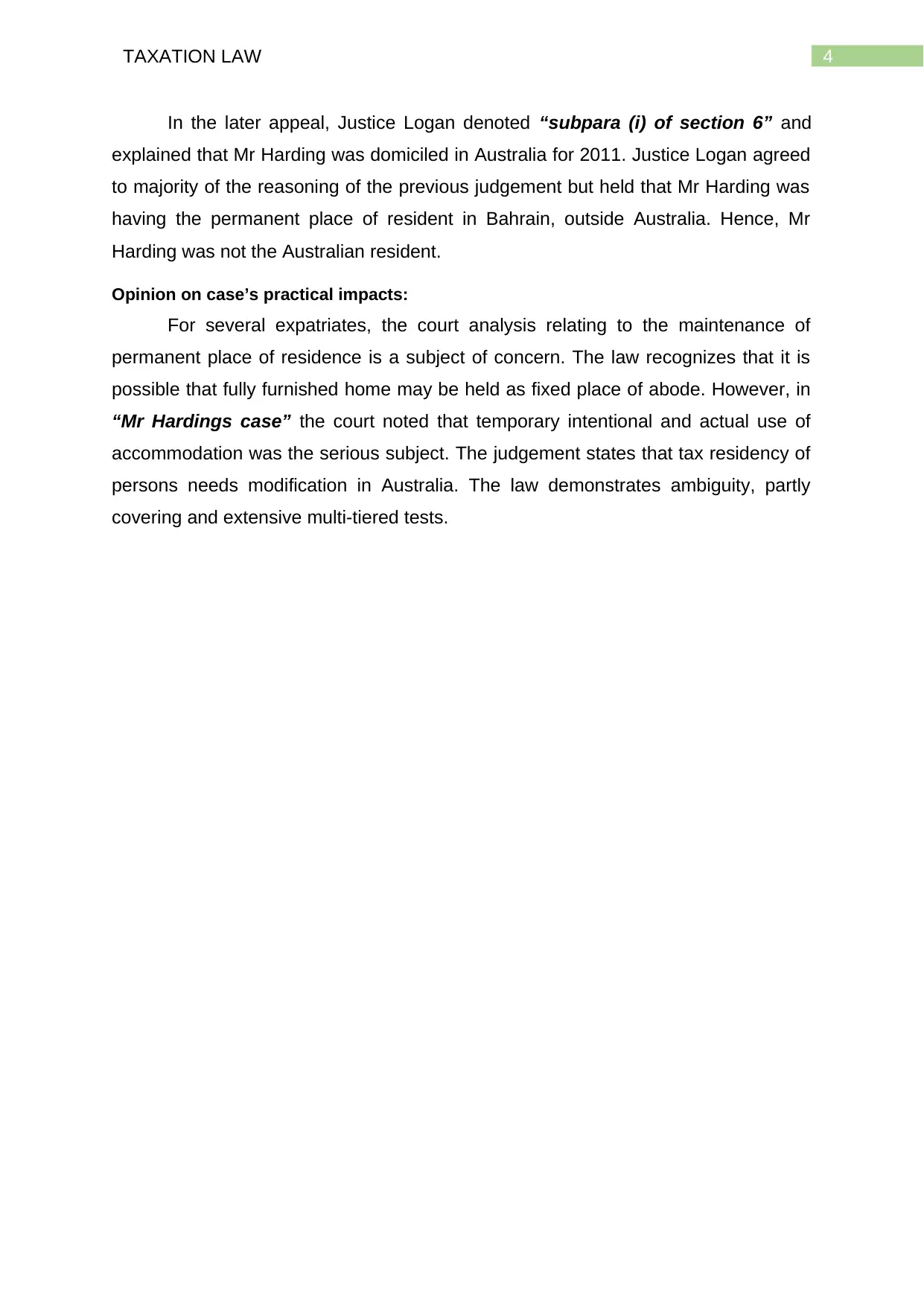
4TAXATION LAW
In the later appeal, Justice Logan denoted “subpara (i) of section 6” and
explained that Mr Harding was domiciled in Australia for 2011. Justice Logan agreed
to majority of the reasoning of the previous judgement but held that Mr Harding was
having the permanent place of resident in Bahrain, outside Australia. Hence, Mr
Harding was not the Australian resident.
Opinion on case’s practical impacts:
For several expatriates, the court analysis relating to the maintenance of
permanent place of residence is a subject of concern. The law recognizes that it is
possible that fully furnished home may be held as fixed place of abode. However, in
“Mr Hardings case” the court noted that temporary intentional and actual use of
accommodation was the serious subject. The judgement states that tax residency of
persons needs modification in Australia. The law demonstrates ambiguity, partly
covering and extensive multi-tiered tests.
In the later appeal, Justice Logan denoted “subpara (i) of section 6” and
explained that Mr Harding was domiciled in Australia for 2011. Justice Logan agreed
to majority of the reasoning of the previous judgement but held that Mr Harding was
having the permanent place of resident in Bahrain, outside Australia. Hence, Mr
Harding was not the Australian resident.
Opinion on case’s practical impacts:
For several expatriates, the court analysis relating to the maintenance of
permanent place of residence is a subject of concern. The law recognizes that it is
possible that fully furnished home may be held as fixed place of abode. However, in
“Mr Hardings case” the court noted that temporary intentional and actual use of
accommodation was the serious subject. The judgement states that tax residency of
persons needs modification in Australia. The law demonstrates ambiguity, partly
covering and extensive multi-tiered tests.
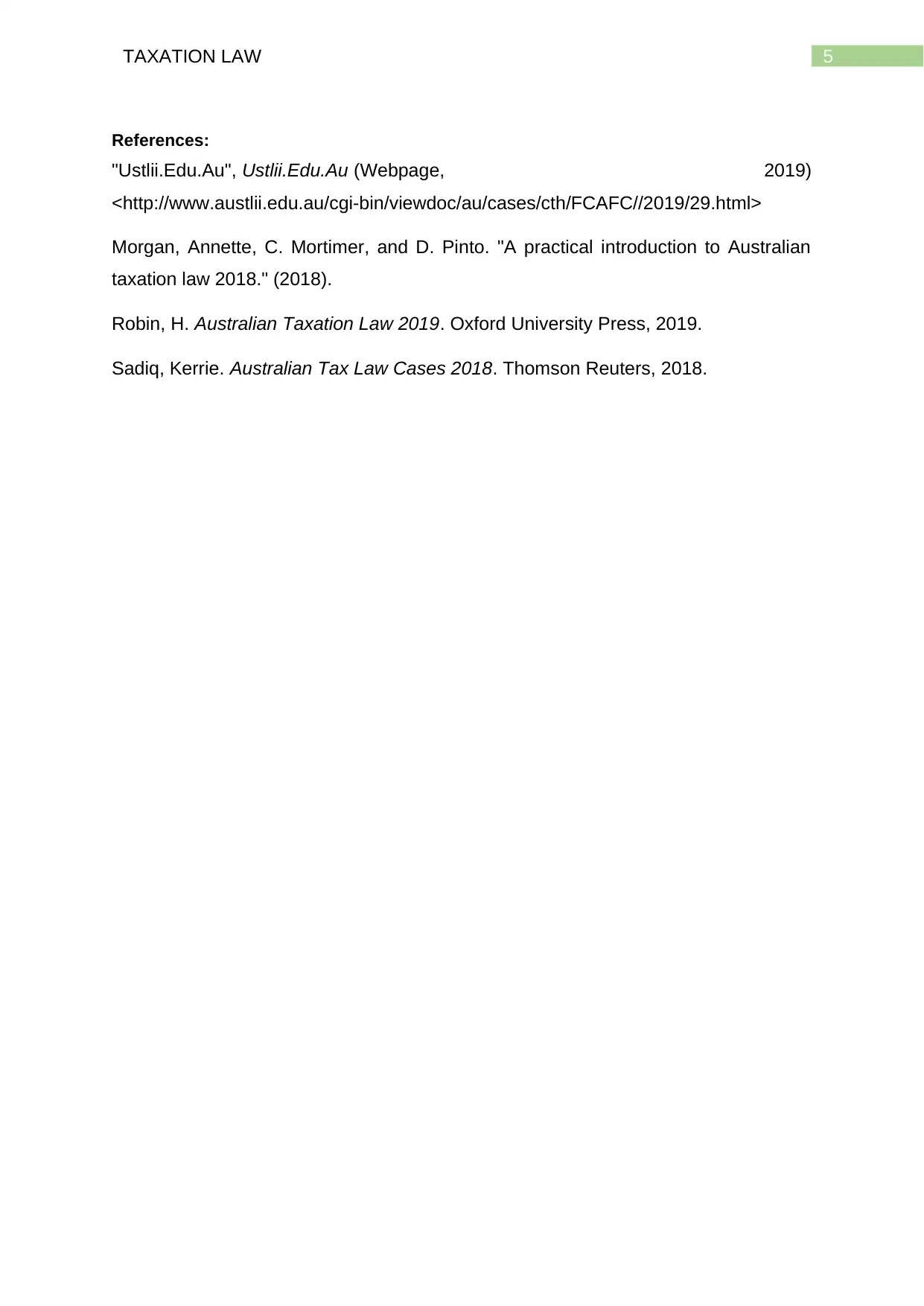
5TAXATION LAW
References:
"Ustlii.Edu.Au", Ustlii.Edu.Au (Webpage, 2019)
<http://www.austlii.edu.au/cgi-bin/viewdoc/au/cases/cth/FCAFC//2019/29.html>
Morgan, Annette, C. Mortimer, and D. Pinto. "A practical introduction to Australian
taxation law 2018." (2018).
Robin, H. Australian Taxation Law 2019. Oxford University Press, 2019.
Sadiq, Kerrie. Australian Tax Law Cases 2018. Thomson Reuters, 2018.
References:
"Ustlii.Edu.Au", Ustlii.Edu.Au (Webpage, 2019)
<http://www.austlii.edu.au/cgi-bin/viewdoc/au/cases/cth/FCAFC//2019/29.html>
Morgan, Annette, C. Mortimer, and D. Pinto. "A practical introduction to Australian
taxation law 2018." (2018).
Robin, H. Australian Taxation Law 2019. Oxford University Press, 2019.
Sadiq, Kerrie. Australian Tax Law Cases 2018. Thomson Reuters, 2018.
⊘ This is a preview!⊘
Do you want full access?
Subscribe today to unlock all pages.

Trusted by 1+ million students worldwide
1 out of 6
Related Documents
Your All-in-One AI-Powered Toolkit for Academic Success.
+13062052269
info@desklib.com
Available 24*7 on WhatsApp / Email
![[object Object]](/_next/static/media/star-bottom.7253800d.svg)
Unlock your academic potential
Copyright © 2020–2026 A2Z Services. All Rights Reserved. Developed and managed by ZUCOL.





